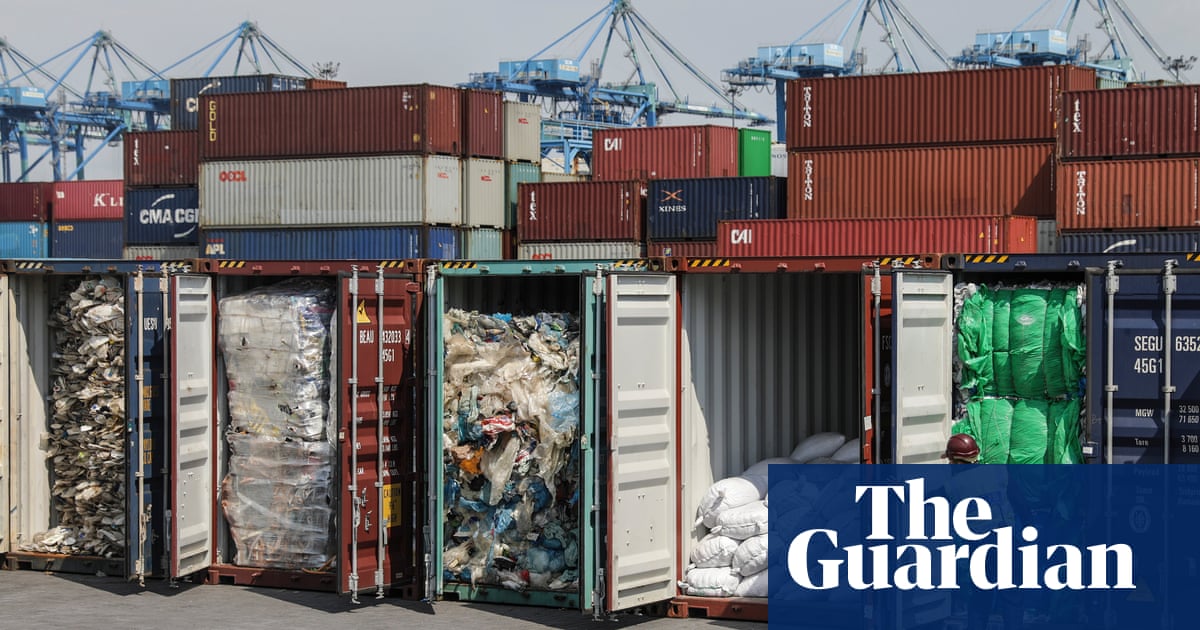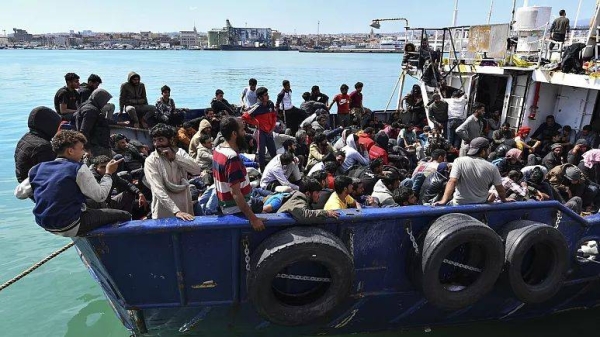
New international rules to tackle the “wild west” global trade in plastic, which has seen wealthy nations dump contaminated plastic waste on to poorer ones, will result in a cleaner ocean within five years, according to a UN transboundary waste chief.
The rules, which come into force on 1 January, aim to make the trade more transparent in order to allow developing nations such as Vietnam and Malaysia to refuse low-quality, difficult-to-recycle waste before it is even shipped.
“It is my optimistic view that, in five years, we will see results,” said Rolph Payet, the executive director of the Basel, Rotterdam and Stockholm conventions. “People on the frontline are going to be telling us whether there is a decrease of plastic in the ocean. I don’t see that happening in the next two to three years, but on the horizon of five years. This amendment is just the beginning.”
At the moment, developing countries – many of which have recycling industries that take in shipments from other nations – cannot see whether a given shipment of plastic is actually recyclable or if it is too contaminated to use before it arrives.
Waste that cannot be recycled usually ends up being illegally burned or dumped in landfills or waterways.
Only 9% of all plastic ever produced has been recycled. About 12% has been incinerated. The other 79% has accumulated in landfill, dumps and the natural environment, where it often ends up washing into rivers via wastewater, rain and floods. Much of it eventually ends up in the ocean.
The new rules, agreed by more than 180 nations under an amendment to the Basel convention, introduce a system of “prior informed consent” for all exports of difficult-to-recycle or contaminated plastic.
Payet acknowledged that tighter export controls may at first see major plastic exporting nations, such as the UK and the US, dispose of waste in landfill and incinerators instead.
“In the short term, yes, there will be landfilling, there will be incineration of the plastic waste,” he said. “But in the long term, if government policies are right and if consumers keep applying pressure, it will create the environment for more recycling and a circular approach when it comes to plastic.”
Turkey is the largest export market for British plastic waste, with Malaysia second, according to October data.
So far this year, Britain has had 22 repatriation requests from seven countries to take back plastic exports, the Environment Agency told the Guardian. They include Malaysia, which sent back 42 containers of “illegal” waste in January, as well as Indonesia, Vietnam, Romania, Croatia, Poland and Belgium.
Under the new rules, prior consent would have been needed for 20 of those 22 requests, presumably resulting in refusals. The Basel amendment has been incorporated into UK law, allowing UK regulators to implement and enforce it.
Payet said China’s ban on plastic waste imports in 2018 had sent “shockwaves” through developed nations, who were reliant on China to take material they could not recycle themselves.
“The China export ban was a signal to the world that something was seriously wrong and we had to fix it.”
As well as plastic waste, developing nations also export the hidden health and environmental costs of disposal. Many of the nations that import problematic or heavily contaminated plastic lack the proper facilities to deal with it.
“It was the wild west for plastics,” Payet said. “It was easier for everybody to put everything in a container and export it without asking questions: ‘Does this country have the capacity to deal with it, the technology to deal with it – and also, what can we do with the things we can’t recycle?’”
The amendment is a “catalyst” for change, he said, and it is now up to governments to encourage the recycling sector, an industry with low profit margins, and other private sector firms, to innovate.
“There is a lot of pressure from industry, from consumers, from supermarkets, to be innovative. Covid-19 has thrown a spanner into the works, but it also helps us to reflect a lot more on how we can repackage food in a healthier way.”
The UK, which alongside the US is the world’s largest producer of plastic, exports two-thirds of its plastic waste. Britain’s total plastic waste exports to non-EU countries in October was 22.9m kg, of which 13.9m kg went to Turkey.
A Department for Environment, Food and Rural Affairs spokesperson said it had pledged to ban the export of polluting plastic waste to non-OECD countries and to introduce tougher controls on waste exports, though as of October the UK was still sending 7.1m kg to Malaysia, which is not in the OECD.
Simon Ellin, of the UK Recycling Association, warned that the new rules could mean more waste plastic going into domestic landfill or incineration.
“In the UK we export about 70% of the plastic we collect because we don’t have the processing capacity to handle it,” said Ellin. “A lot more will be incinerated and landfilled.”
Despite that “short-term hiccup”, said Tim Grabiel, a lawyer with the Environmental Investigation Agency, the new rules would have a positive impact. “I personally believe that from an ethical and environmental perspective, it can have a very positive effect,” he said. “[Contaminated plastic] has been an economic burden on developing countries. We will see a lesser amount coming to developing countries, and it will free up their waste management capacity for their own domestic waste.”












